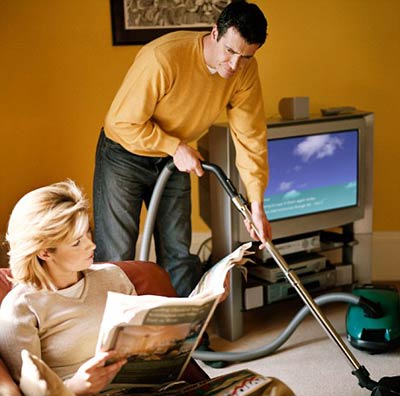|
 Shared duties: 42 percent of men said they did more housework than their fathers did |
|
Back in the 1950s the man was the undisputed family breadwinner. But fast forward 60 years and men today are apparently happy to play second fiddle to their wives when it comes to money. Three-quarters of men now say it is no longer important for them to be the one who earns the most, new research reveals. A study carried out by the US edition of Men’s Health magazine claims it marks the death knell for ‘1950s man’. Husbands as depicted in the hit TV show Mad Men apparently no longer exist - 45 percent of men are now ‘very willing’ to look after the house if their wives earn more. While one in five are already doing so and happily play house husband to their wealthier partners. But there is a price for some - half of men think they have to give up some of their masculinity to become what they considered to be a ‘nurturing father’. Men’s Health found that another big change was how men see other men earning less than their wives - nowadays there is less peer pressure than before to be the breadwinner. The magazine’s US editor Peter Moore said: ‘The ’50s are over. Father didn’t even always know best back then. ‘So, if one of the things a woman knows best is how to bring in a big income, more power to her - and more money to pay for the holiday trip to Aruba.’ He added that men who are stuck in the daily grind look at their colleagues who are at home with their family and think: ‘Dude, you’re a kept man. Congratulations!’ Some of the other figures in the study suggested that old fashioned ideas of being a man had not gone away entirely. Some 89 percent agree that protecting your family is a vital characteristic of being a man today. Only 29 percent strongly agree that it’s OK to cry as a man. (Read by Emily Cheng. Emily Cheng is a journalist at the China Daily Website.) (Agencies) |
在20世紀50年代,男人是無可爭議的養(yǎng)家人。 然而在60年后的今天,男人卻似乎很愿意在養(yǎng)家大任上擔任妻子的副手。 新調(diào)查揭示,現(xiàn)在四分之三的英國男性認為家里誰掙得更多對他們而言已不再重要。 《男士健康》雜志美國版開展的調(diào)查稱,這標志著20世紀50年代男人形象的終結(jié)。 熱門電視劇《廣告狂人》中描繪的丈夫們顯然已不再存在,現(xiàn)在有45%的男性表示,如果妻子掙得更多,他們將“非常愿意”待在家中做家事。 有五分之一的英國男性已經(jīng)開心地為收入更高的另一半做起了“家庭煮夫”。 但某些人也因此付出了代價——半數(shù)英國男性認為他們?yōu)榱顺蔀楹细竦摹澳贪帧保坏貌粊G掉一些男性特征。 《男士健康》發(fā)現(xiàn),男人們對其他收入不如妻子的男人的看法也發(fā)生了重大變化。如今沒有那么多來自同輩的壓力來逼迫男人去承擔家庭生計。 該雜志的美國版編輯皮特?摩爾說:“50年代結(jié)束了。就算是在那個時候父親也不總是什么都懂。” “所以,如果女人最擅長的一件事就是賺大錢,那么她就能獲得更多權(quán)力,還能為阿魯巴度假之旅支付更多錢。” 他還說,那些身陷單調(diào)的日常公務(wù)的男人們?nèi)绻匆娡潞图胰艘黄鸫诩抑校瑫耄骸袄闲郑憔褪莻€吃軟飯的。祝賀你咯!” 調(diào)查中的其他一些數(shù)據(jù)顯示,作為男人的老派觀念并沒有完全被拋棄。 大約89%的人一致認為,現(xiàn)在作為一個男人,至關(guān)重要的就是要保護好家人。只有29%的人強烈同意男人也可以哭泣。 相關(guān)閱讀 (中國日報英語點津 陳丹妮 編輯:Julie) |
|
Vocabulary: play second fiddle to: 當……的副手;居次位 peer pressure: (同輩人之間的)趨同心理壓力,攀比心理壓力 daily grind: 例行苦事,每天得干的苦工 kept man: 小白臉,吃軟飯的 |
